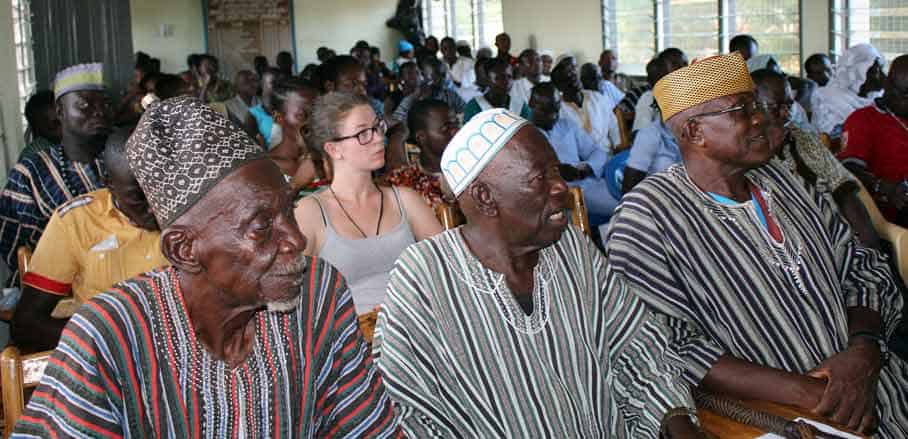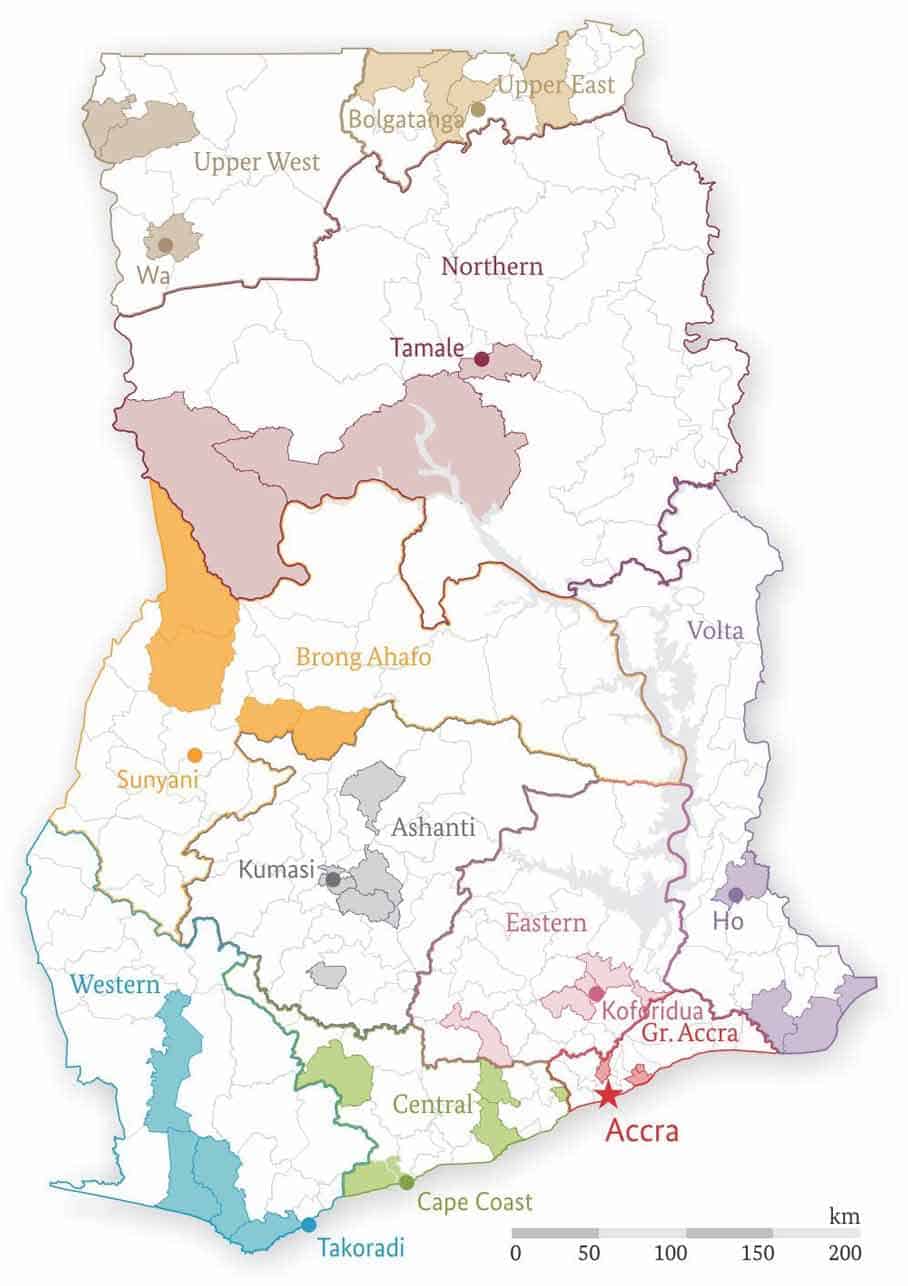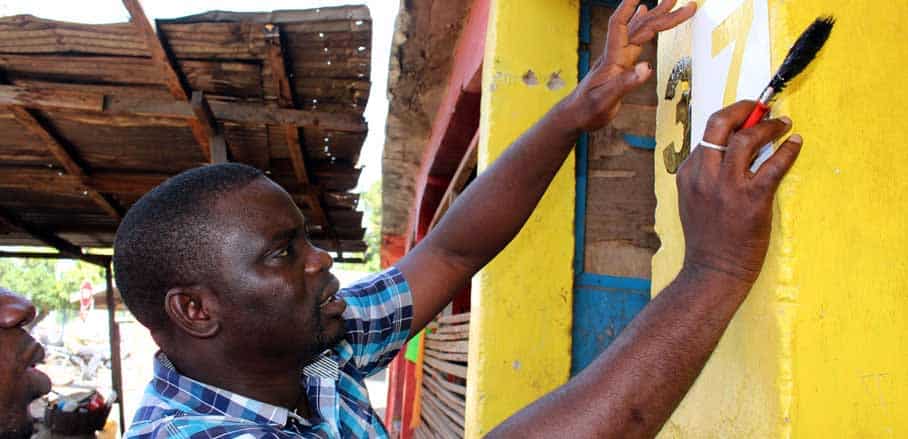Creating sustainable and liveable cities to support decentralisation in Ghana
By Lennard Kehl
Ghana crossed the urban divide in 2010 and its urbanisation is expected to grow to 65% by 2030. Rapid urbanisation accelerated by rural-urban and North-South migration due to economic imbalances causes serious challenges for local authorities with limited capabilities to provide public services by adequately meeting the needs of citizens. Insufficient local budgets and lacking coordination among responsible institutions promote the development of slums and unpredicted expansion of urban cities.
On behalf of the German Federal Ministry for Economic Cooperation and Development (BMZ), the Support for Decentralisation Reforms (SfDR) programme supports the implementation of the Ghanaian decentralisation reforms at regional, district and local level. It aims to increase knowledge and practical capabilities in local development planning, revenue generation, financial management and public service delivery at Metropolitan, Municipal and District Assemblies (MMDAs) in 40 districts throughout the country, of which 25 are urban. The programme’s goal is to strengthen MMDAs as driving actors for economic growth and the creation of decent living conditions to ensure a sound and even development. SfDR’s activities are in line with the German core positions to Habitat III:
Empowering cities as development actors
To create enabling conditions for improved local development, one of SfDR’s core activities is the assistance to local authorities in generating internal revenues to provide a reliable financial basis for the provision of modest public services. It also supports the application of transparent decisions and proceedings and increases the accountability of local public administrations vis-à-vis with its citizens.

Support decentralisation in Ghana: budget hearing. © GIZ/Anita Benassi
SfDR supports Ghana’s national street naming and property addressing process to promote the collection of property taxes and public fees which constitute a main source for Internally Generated Funds (IGF). The program develops the abilities of technical and administrative local staff e.g. using the Land Use Planning and Management Information System (LUPMIS) for the development and implementation of spatial databases for properties and businesses within the community. “Ntobua”, a software for revenue management was developed to increase IGFs of local authorities in a more systematic way. Some districts managed to enlarge their funds by a wide margin and have become multipliers which have spread the innovation and their experiences to their peers. Sustainability is ensured through standardised trainings and manuals on revenue generation and the integration of IT systems. SfDR also makes contributions to the development of national strategies and facilitates partner districts to elaborate their individual strategies for the stepwise increase of communal revenues.
Integrated development
To address the challenges of development planning and budgeting in Ghana’s districts, SfDR applies a multi-level and multi stakeholder approach. The program introduces innovative participatory planning methodologies and tools to assist technical staff of municipalities facilitating the planning and budgeting processes in a more inclusive and gender-sensitive manner. Capacity development measures are provided to all planning coordinating units in all partner districts. Furthermore, districts are supported to improve capacities in data collection, analysis and use for planning and decision-making. In order to harmonise countrywide decentralisation reforms, SfDR aims to improve the cooperation structures between key actors of the decentralisation process. The programme activities support key decentralisation reform actors in defining their roles and functions, and to establish effective coordinating mechanisms to mature a conducive cooperation environment.
On the national level, the National Development Planning Commission (NDPC) and the Fiscal Decentralisation Unit of the Ministry of Finance are supported to give appropriate guidelines and supervise the implementation of these by the municipalities. SfDR also promotes citizens engagement in the planning, budgeting and general development of their districts. Traditional authorities, women groups, trade associations, and civil society organizations are strengthened to facilitate popular participation. Through citizen participation mechanisms and social control through the population the programme contributes to transparent, accountable and citizen-oriented planning and budgeting to ensure sustainable development. Meaningful participation of people requires a decent understanding of the content and of technical conditions for planning. Beside general training activities, SfDR also invites particular groups of participants for training events in order to increase citizens’ capacities for wider participation in public hearings. This includes for example tuitions on gender-sensitive budget planning tools for females as well as for public officials to increase transparency and more effective accountability mechanisms in the management of resources and the development of districts.
Decent environments for people to live in
With sectoral and organizational support to the Ministry of Local Government and Rural Development (MLGRD) and to 40 partner districts, SFDR promotes the establishment of institutional capacities for implementing Ghana’s Urban Development Strategy. Co-financed by Cities Alliance, SfDR provides extensive advice and organisational support to the Urban Development Unit (UDU) within the MLGRD in order to strengthen the institutional and administrative capacities of the authority in developing inclusive, safe and resilient urban environments. The additional technical capacities enable the personnel of UDU to effectively implement the National Urban Policy and to provide mindful guidance for a conscious country-wide urbanisation. Related measures come along with applicable advisory services to foster Ghana’s active participation in the Habitat III process.
Finally, in future SfDR will also encourage Local Economic Development (LED), not only since it increase the generation of revenues through taxes, but moreover as it aims to enhance living conditions and environments from the bottom.

Support decentralisation in Ghana: SfDR partner districts
